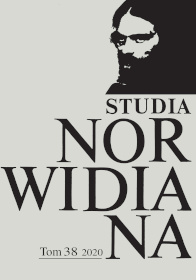Deotyma – „Dziesiąta muza” Norwida
Deotyma – Norwid’s “tenth Muse”
Author(s): Olaf KrysowskiSubject(s): Language and Literature Studies, Studies of Literature, Polish Literature
Published by: Towarzystwo Naukowe KUL & Katolicki Uniwersytet Lubelski Jana Pawła II
Keywords: Romanticism; lyric; poetry; improvisation; Muse; inspiration; irony
Summary/Abstract: This article is an attempt to recreate the image of Jadwiga Łuszczewska from literary and epistolary works of Cyprian Norwid. The young improviser aroused controversy not only among the critics, but also among the members of the art society in Warsaw in the era of romanticism. Norwid, however, considered her personality as original, modern and capable of refreshing the Polish poetry. In his poems he described her as „the tenth Muse” and compared to Sappho, who was called exactly the same name by Plato, in recognition for her poetic talent. Moreover, he depicted her in an idealized manner, like acontemporary Sibylla, who gives advise to the nation on how to proceed in a tragic historical period. Norwid’s enthusiasm waned at the begining of 1860s, when it became clear that the poetic skills of Deotyma were moving in circles, constantly exploitingthe same motives, ideas and aesthetic means, not being able to go beyond the initially drawn horizon. He realized that behind the female figure he himself ennobled—a comforter, Samaritan, visionary, a statuesque Muse—there is a personality of an artist, which is humanly imperfect and in some aspects trivial, affected or philistine.
Journal: Studia Norwidiana
- Issue Year: 2020
- Issue No: 38
- Page Range: 5-20
- Page Count: 16
- Language: Polish

